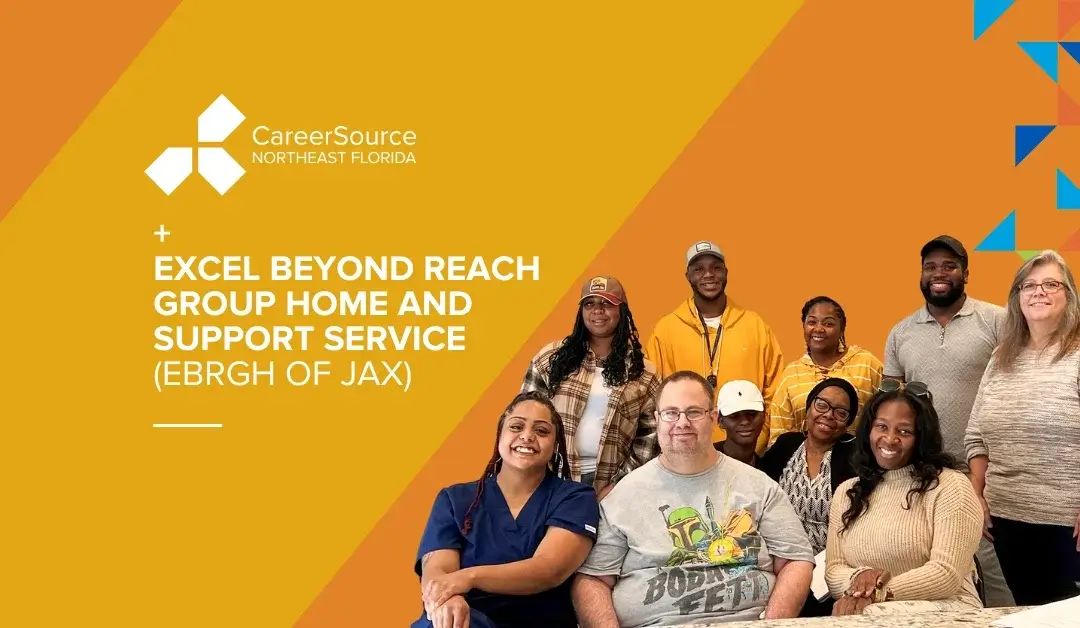More than half of the employees at Excel Beyond Reach Group Home and Support Services (EBRGH of Jax), a nonprofit that has served intellectually disabled adults in Jacksonville since 2017, have learned American Sign Language (ASL) thanks to funding provided through CareerSource NEFL’s Customized Training Program.
“Many individuals with intellectual, physical, and acquired disabilities over the age of 23 are confined to their parents’ homes and, as they age, they typically have little to no social interaction with friends,” said EBRGH CEO and Founder Stephanie Forde. “Our mission is to offer them new skills through vocational training, help them find employment, along with volunteer activities or daily activities, to keep them socially engaged – with a goal to maximize the potential of the people we serve to help them lead productive, meaningful lives.”
EBRGH Jax Group Home Manager Chantell Willis initially became aware of CareerSource NEFL through a job fair, then discovered more about the customized training program on the organization’s website. Afterward, Willis emailed CareerSource NEFL’s Carol Cullen to find out more.
“We only have one deaf person who stays with us, but parents who have deaf children have been reaching out about staying at our group homes, and we’ve had to turn them away because we weren’t certified or qualified to communicate with those individuals,” Willis said. “At that time, we could only communicate with our deaf individual by text, so we already felt we were giving him such a disservice by not being able to communicate with him fully.”
But, with the funding provided through CareerSource NEFL, 12 of its 17 staff members completed training in ASL in May. Two-hour classes were held each Tuesday over 20 weeks, led by Florida State College at Jacksonville (FSCJ) Instructor Michelle Fletter.
“She was amazing,” Willis said. “Michelle is deaf herself, so when we initially met her we’re like ‘oh boy, we don’t know ASL…how are going to communicate with her?’ We were so shocked that we could still communicate with her, even in the early stages of the classes, even though she didn’t speak…she slowed her signing down for us…it was truly an amazing experience.”
Willis, who went through the classes herself, said she had taken ASL Courses before she graduated from high school in 2000 – but remembered very little 24 years later.
“I still knew how to sign the alphabet and numbers, but that was about it,” she said. “It may have made the transition easier for me than the others in the class, but not much.”
EBRGH currently serves nearly 20 people and operates three group homes on the northside of Jacksonville: an all-girls home, an all-boys home, and another ‘mixed home,’ which Willis describes as a “total care home” where they serve individuals with a range of more severe disabilities—such as dementia and Alzheimer’s Disease—who “don’t get out as much as the others.”
However, those who are more highly functioning have the opportunity to take part in many outside activities, including a seven-day cruise to Puerto Rico and St. Martin.
“Knowing sign language on that cruise was exceptional,” she said. “I know our deaf individual felt more at ease being able to communicate with us in that type of environment.”
Willis said that as a nonprofit that relies primarily on donations to maintain its operations, the ASL Training probably wouldn’t have happened without the customized training program.
“It would be extremely difficult without the funds to provide this type of training to that many people on our staff,” she said.
Cullen, CareerSource NEFL’s Industry Manager for Healthcare, says. At the same time, the organization has helped companies use customized training funds to learn a foreign language. EBRGH was the first in Northeast Florida to use it for sign language training.
“Most companies and nonprofits don’t realize the broad application of our customized training program and how agencies like Excel Beyond Reach can use these funds for many types of training to upskill employees to take on new roles at their company or, in this case, provide broader communication skills,” she said.
Willis encourages other nonprofit agencies to contact CareerSource NEFL to learn more about how it can help their organizations.
“I’m quite sure there are other group homes in Jacksonville that serve deaf individuals which have employees who can use this type of training,” Willis said. “I think being able to communicate with sign language is just another way to bring our communities together.”
Willis says they hope to work with CareerSource NEFL again in the future. “It only took about 30 days to get the ball rolling on this training, which surprised me,” she said. “We’re always getting new staff, so we would love to have another class for new employees and maybe a smaller class for our residents. Of course, it wouldn’t be as intense as ours because of their cognitive functionality, but it would be great if our residents could sign ‘Good morning’ and ‘How are you feeling’ with the deaf residents. But, more importantly, this training will make us more comfortable accepting more deaf residents into our group homes in the future.”
Photo Caption: (Back row standing left to right) Angela Long, Malcolm Byrd, Chantell Willis, Dukequarius Garrett and instructor Michelle Fletter. (Front row sitting left to right) Anjelica Harrington, Aaron Andrews, Lakhiyah Gardner, Bertha Louise Magee and EBRGH Owner/Founder Stephanie Forde.

